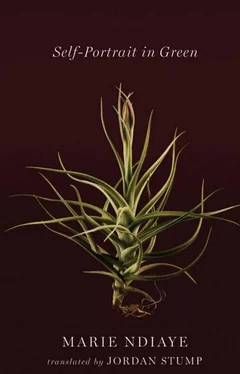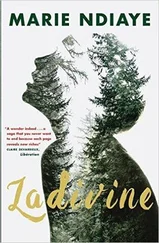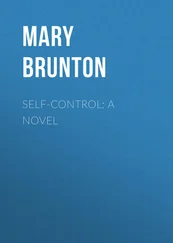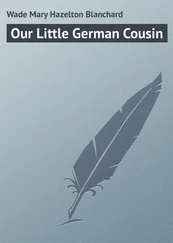In late 2002, pregnant with my fifth child, my thoughts full of the stories told to me by my new friend Katia Depetiteville, or the woman who takes herself for Katia Depetiteville, I receive a postcard from Marseille signed “Maman.” I first assume there’s been some sort of mistake, but the card is indeed addressed to me. Next to the stamp is another stamp, a mock stamp with a tiny photograph of a baby, and an arrow pointing to that baby with the scrawled words “Your new little sister.” This leaves me stunned to the point of terror. Without a word to anyone, I bury the card in our neighbor’s chicken pen, close by our house. But Christmas is coming, and remorse gnaws at me. If this is all real, I tell myself, my mother deserves an answer. But what if it isn’t? Is there no danger in behaving as though it were? One evening when the moon is round, I straddle the chicken pen’s fence and dig up the card, just long enough to note the address my mother has written down as her own, then bury it again, deeper. On the other side of the pen, the geese have spotted me, and now, frightened, they’re squawking in their horrible, broken, strident voices. I flee, not certain I haven’t been seen. Suppose they’d released the dogs, convinced there was a thief on the prowl?
I write my mother a dishonest, overjoyed letter, and, pretending to believe her, offer my delighted congratulations. She answers immediately with an invitation to come see her in Marseille. Not one word on my own children, on the health of this child or that — the one soon to be born she knows nothing about. I recognize my mother’s handwriting: the dots on the i’s are oversized circles, every sentence contains several startling mistakes, signature mistakes in a way, unique. She suggests, almost demands, that I come see them for Christmas, claiming she’ll be leaving immediately after to visit her husband’s family. Radically incompatible with my mother, that word husband leaves me distraught. The squat woman with the gray edge of a shawl always encircling her face, the woman with the hollow, yellow cheeks, with the thick glasses in black plastic frames, the desperate, inflexible woman who never spoke the name of any man after my father left, how can that deeply isolated woman now speak of a husband? And a child? I calculate her age: forty-seven. Possible, perhaps, but not at all plausible. And isn’t it unseemly to invite me down for Christmas, me alone, without a word concerning her grandchildren, as if she suddenly had none, or didn’t recognize them?
Two days before Christmas, I’m on my way to Marseille. We’ve agreed that my mother will come and meet me at the Saint-Charles station, and as I wait on the platform, burdened, anguished, drained, thinking she’s forgotten to come, or that this whole affair is so unlikely that it can’t possibly culminate in the actual arrival of my actual mother, I see a smiling woman approaching, wearing my mother’s unattractive glasses, followed by a man — and, on that man’s arm, a little girl. The woman is bare-headed, and her hair is dyed red and cut short, her brow draped with bangs that she regularly tosses out of her eyes with a jerk of the head. Her makeup is impeccable, very ladylike, she has fine hose, high-heeled strapped shoes, etc. I stare mutely, knowing it’s her, my mother, but unable to feel it in anything about her. She’s tall, poised, and, for what she is, perfect. She kisses me politely, without tenderness, and I note that her manners too, and her gestures, are more elegant than before. She introduces the little girl, whose name is Bella, and the father, a certain Rocco. Nothing leads me to believe that she finds this situation at all odd or disconcerting, since she speaks to me as naturally as can be, in that metallic voice that was even long ago hers. She smiles continually, her wide smile without warmth, perfectly at ease, a woman of the world. I fleetingly sense that my mother’s gaze is not in unison with her smile, that behind her slightly distorting lenses an anxiety hovers, even a panic, unbeknownst to her. But is that certain? A second later her gaze is bright and joyous. Is that certain?
And so I follow this new little family out of the station, then into a complication of narrow streets, dark despite the blue sky and the bright winter sun. My mother and Rocco walk a few paces ahead, and every so often the child turns around, perched on her father’s shoulders, to look at me with an astonishment full of suspicion. She’s a pretty little girl, her eyes dark and hard, elegantly garbed in an orange corduroy coat with big brass buttons. Not once do my mother or her husband look back to be sure they haven’t lost me. Rocco is much younger than my mother — yet who could ever guess my mother’s age now? Rocco must be about as old as I am. And suddenly I discover, as I consider her briskly swaying hips, her delicate calves swathed in shimmering hose, that my mother is a kind of green woman I haven’t yet come across — and what fate is it, I wonder, that demands that my mother herself must now cross my path as a green woman, to convince me that such is my destiny? No need to see her actually dressed in green — we’re well past such childishness now, in a way. She’s dressed in pink, in a suit cut from an inexpensive fabric that manages to put up a good front all the same.
We turn into a dank alleyway, so macerated in its own damp that you can easily conclude the sunlight never touches it. Rocco opens a door and we walk down a dark hallway, where a second door gives onto a room shrouded in semidarkness. My mother hurries to open the curtains, but the room is scarcely lighter than before. It’s small and cluttered, thick with the odors of a stingy, shabby existence. Rocco kindly offers me a sandwich and something to drink. Meanwhile, still standing, one foot perpendicular to the other, my mother looks as though she’s struggling to keep the alarm and embarrassment out of her gaze. Whenever she lets down her guard, I see her eyes darting uneasily this way and that, never looking straight ahead. She then raises her hands to take off her shawl, forgetting she’s not wearing one. Seeing that I’ve seen her, she furrows her brow.
I spend three days in Marseille. With each passing hour I am more resolved never to come here again, never to have anything more to do with my mother’s new family. She struggles valiantly to bring order to this new life of hers, but the forces at work overrun her on all sides. Little Bella is prone to tantrums of paroxysmal violence. Although my mother does all she can to keep it from me, I finally learn that Bella lives with a host family during the week, joining her mother and Rocco only on weekends. Rocco is gentle and amiable, but regularly spouts bellicose anti-Arab rants that leave my mother mortified. She blushes and lowers her eyes, and her anger and shame burden me with a sort of ineffectual pity. It pains her to see me judging that repellent side of her Rocco’s personality. But, I ask myself, why should I care? Why should I care, in the end, what becomes of her, so long as she’s not being beaten? In his everyday behavior, Rocco is a peaceable man. Of my two sisters she won’t say a word, and no doubt she knows nothing. Losing custody of Bella during the week must have hurt her terribly. But in all her destitution she makes a great show of superiority and ebullience. I look at her, bewildered: can the fact that she’s come to understand, as my father thought he’d realized many times, that she hasn’t led a worthwhile life, and that her time on this earth will come to an end two or three decades hence, can that really explain such a renunciation of the woman she’d so stubbornly striven to become? All the same, I can only admire her bravado, however joyless. They’re in difficult straits, forced to keep a careful eye on every meager expense. Has she found work again? And Rocco, what does he do with his days? What of their income? She eludes my direct questions, gives me abstract answers—“for as long as this world’s been around, everything’s always worked out in the end,” “the job market is a snake that swallows its own tail,” “we’re holding our ground”— while, sheltered behind her enormous glasses, her eyes dart wildly this way and that, in search of a rescue she can’t define.
Читать дальше












